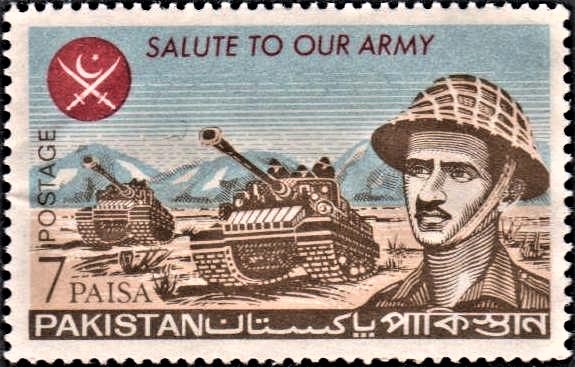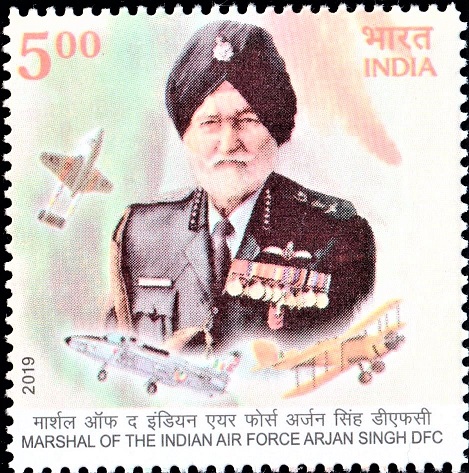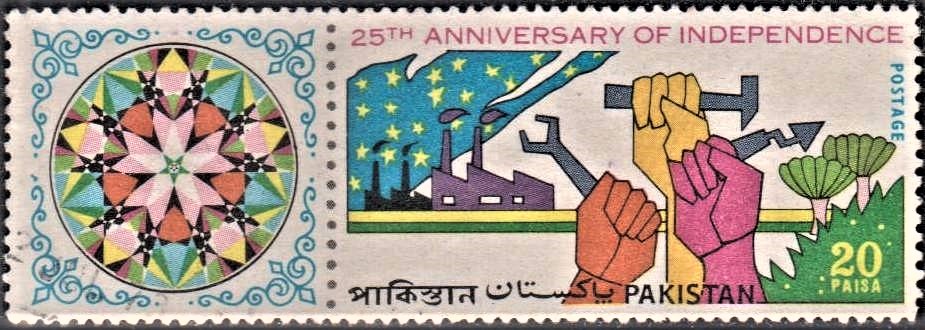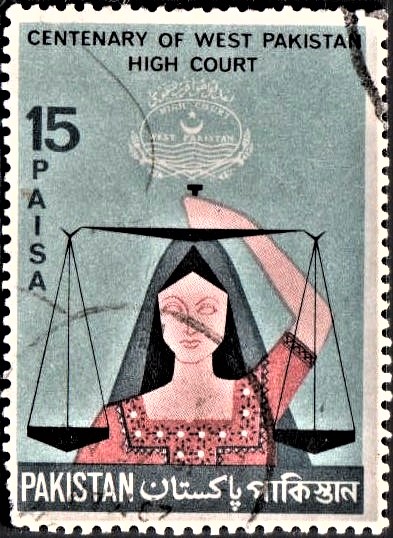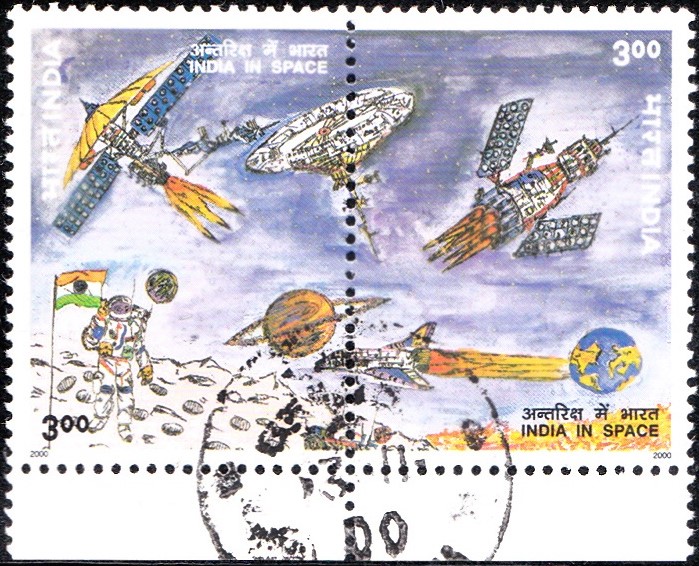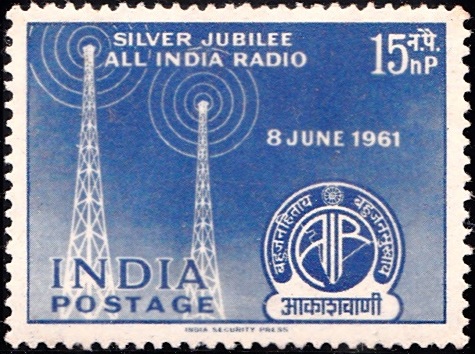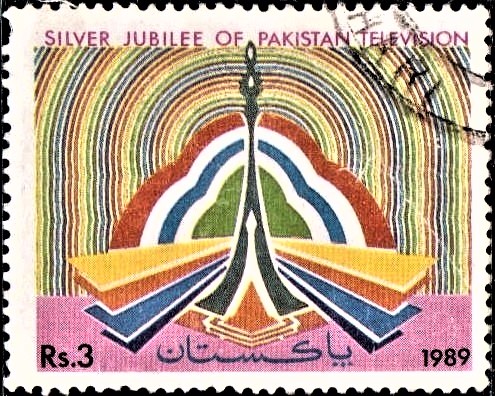
Pakistan Television
A commemorative postage stamp on the Silver Jubilee of Pakistan Television Corporation (PTV), the Pakistani state-owned broadcaster :
 Issued by Pakistan
Issued by Pakistan
Issued on Nov 26, 1989
Issued for : To commemorate Silver Jubilee of Pakistan Television Pakistan Post Office is issuing one commemorative postage stamp of Rs. 3/- denomination on November 26, 1989.
Designer : Adil Salahuddin
Type : Stamp, Postal Used
Denomination : Rs. 3/-
Colour : Multicolour
Size of Stamp : 41 x 35 mm
Size of Print : 37 x 29 mm
Perforation : 13C
Paper : 102 gsm dual purpose coated PVA gum
Quantity : 3 Million
Number of stamps in a sheet : 35 (thirty five) (5 x 7 rows)
Process of Printing : Litho Offset
Printer : Pakistan Security Printing Corporation
About :
- An important day in the history of communications in Pakistan is 26th November. The country’s first pilot television station went on air from Lahore that day. Television in Pakistan has never looked back.
- Television was introduced in Pakistan to promote an enlightened awareness of the world as well as to foster a consciousness of Pakistan’s own heritage, the social and economic growth of the country and to provide inspiration and guidance for progress and prosperity. Television was considered necessary also for bringing about a genuine revolution in the social and cultural life of the masses, apart from its role as an important and most effective medium of education, entertainment and information.
- In October, 1963, it was decided to establish a general purpose television service with the participation of private capital and under the general supervision of the Government of Pakistan. The first step towards the introduction of television was taken when the Government of Pakistan signed an agreement with the Nippon Electrical Company of Japan, allowing it to operate two pilot stations in Pakistan. The first of these went on air to Lahore on November 26, 1964. The era of the electronic medium of mass communication had arrived.
- On the completion of the experimental phase, a private limited company called Television Promoters Ltd. was set up in 1965. This Company was later converted into a public limited company in May 1967, when the Pakistan Television Corporation came into being.
- Ambitious plans were chalked out for the development of television from the inception and a good many of these goals have been realised. Talent in the country has been sought out, nurtured, encouraged and developed. A great number of skilled and technical hands, producers and allied personnel were required. The need has been fully met from within the Country. With modest beginnings, PTV quickly progressed to become an established TV network, recognised as one of the leading TV organisations in South East Asia. In achieving this, the enthusiastic and dedicated efforts of those working in PTV as well as those associated with it and the encouragement of the Government of Pakistan were the most vital factors.
- Today in its twenty fifth year, television has a National Network covering the five main programme producing and transmitting Centres at Karachi, Lahore, Rawalpindi, Quetta and Peshawar. These are linked with 28 high powered re-broadcast stations. The Telephone and Telegraph Department of the Government of Pakistan has established a microwave link connecting all these live Centres and their re-broadcast station to form the PTV hook-up, known as the National Network.
- The coverage now extends to about 86.39% of the total population and is viewed by people in all the four Provinces of the country. Million more are expected to be brought under the viewing range with the establishment of more re-broadcast stations. The area under the umbrella of TV signals has steadily then, from 8,029 sq. km. in 1964 to approximately 295,906 sq. km. in 1989.
- The total estimated TV set count now stands at more than 1.5 million, with an average viewership of about 8 persons per set. The viewership is higher in semi-urban and rural areas, as also on special occasions including live transmissions via satellite and telecast of sports events.
- The national network carries most of these telecasts while individual Centres put on air programmes of regional interest. Transmissions via satellite, which commenced as early as 1972, are now a regular feature and cover important international events, including sports, of interest to the viewers in the country.
- Colour Television came to Pakistan in 1976, and has added immeasurably to the viewing pleasure of the masses. The sophistication and artistry of PTV productions has also stood to gain from the introduction of colour. PTV productions have been entered in international competitions since 1971 and many are the awards they have own for the country.
- PTV has also instituted the PTV Annual Awards, to acknowledge and honour excellence in various professions concerned with television. PTV Awards were first awarded in 1980 and have since been an incentive and encouragement to healthy competition and increasingly better standards of production and performance among TV professionals.
- From as early as October 1975, educational telecasts have been on air, on the national network. The foundations of the educational television have been firmly laid. With the increased availability of resources, still greater development in the field of educational television will be on the cards.
- Since January 1988, a regular morning transmission has commenced, (7 a.m. to 8.15 a.m.). Special short programmes are telecast in the morning. It is planned to extend the morning transmission, very shortly.
- At present the daily telecast time is 7 hours – 7 days a week. There is, in addition, a regular morning transmission. The telecast is divided into units of programme hours in which time slots of 5, 10, 15, 25, or 50 minutes are provided for in various combinations. Programmes are generally made to conform with these durations, though exceptional items and special coverages may be longer. In principle, in an hour of telecast, there is on the average, some 50 minutes of programme material, interspaced with 10 minutes of commercial and presentation items including programme promotion, religious and other motivational quotations.
- PTV has exported and is exporting a good number of its programmes and has thus served as an ambassador of Pakistan’s culture abroad.
- During the early years of PTV, a Central Training Institute was set up for the training of programme producers and engineering personnel. This Institute has been elevate to a full-fledged PTV Academy, imparting training to television personnel in all fields – news, engineering, management, finance, current affairs, programme production etc.
- Though public service is the basic principle underlying programme planning, PTV also makes available commercial time to advertisers on very reasonable terms; to help promote national trade and industry. For the benefit of advertisers, a central Sales Office has been established at Karachi with regional sales offices at Lahore, Rawalpindi, Quetta, Peshawar, Faisalabad, Hyderabad, Multan and Gujranwala, for handling bookings of commercial time and sponsorships of programmes.
- Over the years, PTV has brought out a number of publications of general and professional interest.
- Development, with PTV, is a way of life. Over the past 25 years, it had developed in all spheres, gradually and surely. It is PTV’s earnest endeavour to provide inspiration to the nation and help in the process of dissemination of Islamic values and nation building activities besides meaningful programmes even in the context of entertainment programme.
- The development plans being pursued should help realize these objectives.
- (Contributed by Pakistan Television).
- Issued by The Director General, Pakistan Post Office Department, Islamabad.
Subscribe
Login
0 Comments
Oldest


